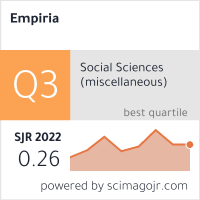The research process as a system of problems: a reconstruction of its logic and structure based on seven questions
DOI:
https://doi.org/10.5944/empiria.40.2018.22016Keywords:
epistemology, scientific methods, design, methodology, structure of knowledgeAbstract
A model of analysis about the research process as a whole is proposed based on seven basic questions: what, who or what things, where, when, how, for what purpose and why to investigate. The aim is to reconstruct the logic commanding the definition of a phenomenon individuated conceptually, spatiotemporally as an object of knowledge, and also the modes, objectives and purposes of an inquiry. These seven questions constitute a system of basic problems that, according to the hypothesis of a unified method, account for any research process. The said hypothesis is grounded on a dialectical perspective which highlights some of the fundamental tensions running through the process: available and attainable knowledge, theoretical, abstract and general contents as well as empirical, concrete and singular contents; scientific concepts and common sense. Moreoever, a number of practical consequences are highlighted which can contribute to the teaching of methodology, in addition to the planning and formulation of a research project. This is exemplified by an interdisciplinary research project in the Social Sciences of Labour.
Downloads
Downloads
Published
How to Cite
Issue
Section
License
Los autores que publican en esta revista están de acuerdo con los siguientes términos:a) Los autores conservan los derechos de autor y garantizan a la revista el derecho de ser la primera publicación del trabajo al igual que licenciado bajo una Licencia Internacional Creative Commons CC BY-NC-SA 4.0.
b) Se permite y se anima a los autores a difundir electrónicamente las versiones pre-print (versión antes de ser evaluada) y/o post-print (versión evaluada y aceptada para su publicación) de sus obras antes de su publicación, ya que favorece su circulación y difusión más temprana y con ello un posible aumento en su citación y alcance entre la comunidad académica.










